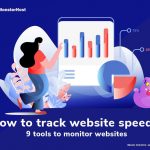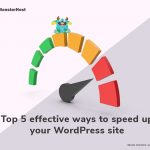When it comes on to your website, speed is everything! How fast your website loads in an indicator of its success. It is responsible for user experience, SEO rankings, and it even influences the conversion of customer visits into sales.
You may have great and interesting content with top Search Engine Optimization (SEO), and this will mean nothing if your website loads slowly. It will frustrate visitors and drive them away. It is your job to ensure your webpage loading speed is top priority.
Here are some ways a slow website can ruin your online success.
Table of Contents
Your Website Speed Is Your First Interaction with Customers
It is said, “first impressions are lasting.” This is great when you customers first impression of your website is a pleasant one. However, when they are met with a slow loading site, it may be their last visit.
Loading time matters a lot. If it is fast you can convert visitors into regular customers. If it is slow, potential customers may leave and never return. It is psychology.
We associate fast websites with professionalism and reliability.
Speed in a highly competitive online community tells customers you are serious about their experience, trustworthy and efficient. A slow website gives off opposite energy. Am I dealing with professionals? Can this site be trusted? And most won’t stick around to find out if it is.
Customers expect your website to be fast
It does not matter how stunning and professional your website is if your website is slow users will never know – they will not wait to find out.
It seems that each day technology evolves a little more. With this evolution came speed. Customers are used to sites loading quickly.
Especially now when customers no longer need to have a computer to access the internet. In fact, most persons now use their smartphones. This means they are on the move and a lot less patient. Persons want quick results, right now!
Think about how impatient you are when you use the internet. Do you wait around for a page to load? Chances are you move to one that loads faster. So, it’s important that your webpage loads quickly from the get-go. Check out your competitors and ensure your page loads faster.
The Speed of Your Website Influences Your SEO ranking
Since 2010 Google announced that it has been measuring website speeds with their ranking algorithms. Noting that this will have an impact on your website’s ranking.
While Google is the most used search engine, it is not the only one checking on your website speed. Bing, Yahoo and other search engines are also taking note of how fast webpages load. The speed of your website shows how fast your website responds in a web search.
A fast website translates to, improvement in conversion rates, increase in your organic search engine ranking potential, better user experience and a boost to your brand.
These together give you an extra bump up the SEO ranking line.
Good loading speed increases user engagement
There are millions of websites on the internet. Why do persons visit yours? It’s simple. Persons visit your website because you have something they want, and they want it now! Do that and you will have happy customers, ones willing to even share your efficient website with others.
That is why the speed of your site is extremely important. Great user experience is linked to the speed at which your website loads.
Visitors find your website engaging when you provide good content, catchy designs and great service, coupled with excellent loading speed.
A slow website is frustrating and with millions to choose from, visitors will not stick around on yours.
Good speed gives more monetization opportunities
Whether you run an e-commerce site or a personal blog, you can make some extra cash from your website by monetizing it. However, before you do, ensure that your site speed is up to par.
If your website loads slowly, monetizing it may do more harm than good.
Website monetization is the process of turning existing traffic on your website into revenue. This is done by giving Google and other affiliate banners permission to advertise on your website.
Since in most cases the ads are displayed first, if your website is slow they will not load quickly enough and you will lose revenue. And this is not just from the monetization but from potential customers who will get frustrated and click off your page.
Many factors affect the speed of your website
You may have a number of unnecessary features and functionality on your website that is slowing you down.
1. The type of hosting
Your website’s performance is linked to the web-hosting provider you use and the type of hosting you choose. When you are just starting out you may have chosen a shared hosting option that is good for beginners. While the traffic to your website starts growing significantly, you will need to upgrade.
There are three main hosting options, Shared web hosting, VPS hosting and Dedicated server. You have to choose the one that will give you the speed you need to operate a successful website.
2. Not Using a CDN Service
If your website gets traffic from different geographical locations and you don’t use CDN service you may be losing out.
A Content Delivery Network or Content Distribution Network, CDN is a network of independent servers and data centers in different parts of the world. It provides better coverage and faster response time to customers. It’s like having outlets in different countries. For example, let us say you shop with a particular clothing store. When someone in America purchases a shirt instead of it being sent all the way from London, it’s sent from a US location. This means the customer receives the purchase faster.
That’s what CDN does with your content. It transfers it in a super-fast and efficient way because your content is also stored close to the location of your customers.
3. Having Excessive HTTP Requests
Whenever someone visits your page, your website sends all the files on your site so they can view them. These files include images, videos, text and JavaScript.
Having too much JavaScript, CSS, and image files can result in too many HTTP requests. A high number of HTTP requests can slow down your page’s load time, which in turn negatively affects user experience. To minimize your requests use Google Chrome Developer Tools to see how many HTTP requests your site actually makes.
You can delete unnecessary images and files. Also, reduce file sizes by compressing them.
4. Unoptimized Images
Can you believe that the beautiful, crisp images on your website may be contributing to it being slow? Well, this really happens when your images are unoptimized.
High-resolution images use a lot of bandwidth to load. The solution is changing the format of the images on your website. Your site will load faster if you use JPEG images instead of PNG or GIF.
5. Too Many Ads
Monetizing your website is undoubtedly good for creating revenue from your website’s traffic. However, if you have too many display ads it can slow down your website. This negatively affects your user experience and compromises your site’s performance.
This is not an encouragement to strip your site completely to improve its speed. It’s simply a matter of prioritizing features and functionality that are important in creating the best customer experience while still representing your brand.
Conclusion
Speed is no longer a luxury but a necessity in today’s society where attention span is short and there are several options. No one sits around waiting for a slow website to load. Not even you.
Slow loading drives customers away, which means the loss of potential sales. Slow websites are bad for business, affects your user experience, sales and conversions.
Speed matters! Improve your website’s speed in order to extend reach, gain returning customers and boost revenue.






